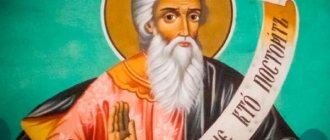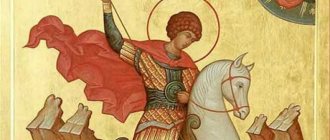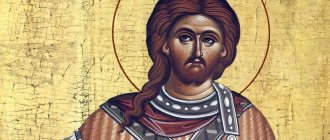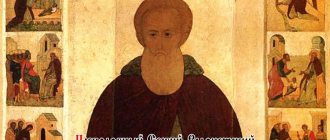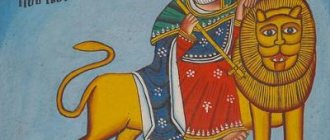Life of the Prophet Samuel
According to legend, the prophet Samuel lived in the 11th century BC. Samuel's parents were Elkan and Hannah. The family lived not far from Jerusalem, in the town of Raphaim Tzofim. Elkan loved Anna dearly, but she could not give him children; Peninn's second wife gave her husband several sons and daughters. Peninnah was jealous and constantly humiliated Anna, and even her husband’s tender assurances of love could not calm her down.
In desperation, Anna came to the tabernacle and prayed to the Lord asking him to give her a son. She promised that she would make him a Nazirite, and he would devote his life to serving the Lord. After some time, Anna gave birth to a son, whom she named Samuel, which translated means “asked for.”
When Samuel grew up, Anna fulfilled her promise and gave Samuel to serve God with the priest Elijah, in Shiloh. Young Samuel's pious behavior captivated everyone. Samuel became a prophet of God in his youth. One day, after a daytime service, while resting, God himself addressed Samuel, but the boy did not understand and decided that the priest was calling him. Elijah realized that the boy had a vision and taught the child how to understand the will of the Almighty. God conveyed to him terrible news about the family of the high priest; God decided to punish the house of Eli because of his worthless sons.
Elijah and his sons, Hophni and Phinehas died, and the people learned that God had given the boy special favor. The war with the Philistines, in which 30,000 Israelites died, threw Israel into turmoil, but Samuel said that this was not an accident, but a determination of God. The Prophet demanded the destruction of all idols and devotional service to God. , so that the people completely destroy idols and turn their hearts to the devoted service of Yahweh.
The Jews repented before God, Samuel interceded for the Israelites before the face of the Lord at Massif. Here he began his activity as a judge of God's people. During this period, the Philistines went to war against the people of Israel. Samuel turned to God for help and he answered his prayer. After this victory, the Philistines did not dare to attack Israel again until the age of kings. Samuel made the rounds of the main cities of Israel and administered justice. He was a selfless and fair judge, and under his rule Israel prospered.
When Samuel grew old, he divided his reign between his children Joel and Abijah. However, they did not imitate their father in hostility to unrighteous enrichment and reverence for God.
One day the elders came to Samuel, asking him to appoint a king so that the people would not fall into apostasy. This saddened Samuel when he realized that disappointment in some rulers prompted him to trust not in God, but in another person. Samuel prayed to know God's decision. God gave in to the wishes of the people and appointed a king. Saul became the first king of Israel. This came as a big surprise to him, because he came from a small tribe of the small tribe of Israel.
However, Saul disappointed with his rule. He became arrogant, domineering and cruel. During the punishment of the Amalekites, Saul disobeyed God: he spared the best animals and the king of the cruel people. After this, the upset Samuel proclaimed the will of God, according to which royal power was to pass to another person. This was David, the youngest son of Jesse.
After this, nothing more is known about Samuel's activities. He continued to pray to the Lord and lead a community of prophets engaged in spiritual educational activities. Tradition says that Samuel died at the age of 87, 2 years before the death of King Saul.
Elkanah and Hana, Shmuel's parents [↑]
Shmuel belonged to the descendants of Kehat, son of Levi ( Bemidbar Rabba
3:11).
Among his ancestors was Evyasaph, one of the repentant sons of Korach, who rebelled against the prophet Moshe and, as punishment for this, was swallowed alive by the earth - but his sons, who proclaimed “Torah is the truth and Moshe is the truth,” were saved ( Megillah
14a;
I Shmuel
1 :1, Rashi).
Shmuel's father is Elkanah, about whom the midrash says that “in that generation there was no one like him” ( Bamidbar Rabba
10:5), studied with the prophets, and his wife Hannah also had the spirit of prophecy (
Megillah
14a).
For ten years Elkanah and Chana remained childless, and, following the law of the Torah, he took himself another wife - Pnina, who had ten children ( Shmuel 89
).
Four times a year, Elkanah and his entire family made a pilgrimage to Shiloh, where the Tabernacle of the Covenant was then located ( I Shmuel
1:3), by his example encouraging other Jews to fulfill this important commandment - thanks to him, the merits outweighed the sins of the children of Israel.
Then the Almighty said to Elkanah: “Because you encourage the Jews to fulfill the commandments, you will have a son who will add merit to all of Israel” ( Tana devei Eliyahu rabba
8).
Visiting the Tabernacle in 2830
(930 BC), childless Hana prayed especially fervently, calling on the Creator: “Lord of the Universe, God of armies!
You have an Army above and an Army below, and I do not understand which of them I belong to. If I belong to the Heavenly Host, then I should neither eat, nor drink, nor give birth to children, nor die - but live forever! But if I belong to the army of the earth, then I must eat, drink, and bear children!” ( I Shmuel 1:11, Rashi
).
“Lord of the Universe! - Hana cried. “Is it really difficult for You, who created countless armies in Your world, to give me one son?!” ( Berachot
31b).
“If You will condescend to the suffering of Your servant ... and give Your servant a male child,” she promised, “then I will give him to God all the days of his life.” That day, the High Priest Eli blessed her, saying: “Go in peace, and may the G-d of Israel grant you your desire, that which you have asked of Him” ( I Shmuel 1:11,17
).
This blessing came true: on the first day of the new year 2831
Chana conceived (
Berachot
29a), and after six months and two days of pregnancy, her son was born (
I Shmuel 1:20, Rashi
).
What does the prophet Samuel pray for?
The life of the prophet Samuel can be called an example of justice and humility. Having practically unlimited power, he remained a humble, meek and fair person, administered a fair trial and did not profit from it. The troparion and kontakion, read in churches in honor of the prophet Samuel, tell about the life and good deeds of the saint. Direct communication with God and the revelations of the prophet Samuel are an example of true faith and humility for all Christians. Prayers addressed to him help to gain protection and leadership.
In prayers, believers often ask the prophet Samuel: for the mental and physical health of loved ones; about assistance in children's studies; about admonition, strengthening in faith; about protection and patronage; about fair resolution in disputes; on reconciliation of the parties.
Prayer to the Prophet Samuel
The gift is favorable, having given birth to you from the laying on of your mother’s hands, worthy of prayer, Samuel, having inherited your fruit and given it to God the Benefactor, as promised. In the same way, the grace of the Spirit rests in you, becoming more glorious, having grown in kindness and adorned with wisdom. Apply the sacred ointment like a priest and reveal yourself as a prophet, seeing the foregoing, and anointing the king with the command of the Divine, and telling the future, judging righteously by the people of Israel, who are constantly sinning and moving away from God, Samuel the Most Wonderful, the Most Rich God-Bearer. Now, not in fortune-telling, lower in the hall, as if first, see face to face, Him whom you desired, putting aside carnal darkness and burdens, and, going around Heaven, rejoicing, prophetically, an equal prophet, a righteous interlocutor and an angel of participation.”
Shmuel - judge of Israel [↑]
Over the years, the whole people learned about the prophetic gift of Shmuel ( I Shmuel
3:19-21).
When G-d spoke to Shmuel in Shiloh, people saw a pillar of cloud connecting the earth with the sky, just as happened during the prophecies of Moshe ( Otsar Ishei HaTanach, Shmuel
).
The Book of Zohar indicates that although Shmuel was only a Levite, he also served as a priest in Shiloh. Indeed, in his spiritual level he was similar to Moshe and the high priest Aaron, and Moshe also served as a priest, although he was only a Levite ( Zohar 2, 148b
).
In addition, during his lifetime, Eli Shmuel began to judge the children of Israel ( Seder Hadorot
).
The Talmud figuratively says that even before the sun of Eli died out, the sun of Shmuel shone ( Yoma
38b;
Kiddushin
72b).
In 2870
(
890 BC
) Shmuel's first prophecy came true: when the children of Israel suffered a crushing defeat at the hands of the Philistines, Eli's two sons were killed.
On the same day, having learned about the death of his sons and the captivity of the Ark of the Covenant, the elderly Eli also died ( I Shmuel
4:10-18).
Replacing his mentor, Shmuel became the Chief Judge of Israel ( Seder Hadorot
). He called the sons of Israel to repentance, convincing them: “If you want to return to God with all your heart, then remove foreign gods and Ashtoreth from your midst. Turn your heart to God and serve Him alone, and He will deliver you from the hand of the Philistines.” And when the people followed his call, Shmuel gathered all the sons of Israel in Mitzpah, and prayed there for deliverance from foreign enslavers.
Hearing that the Jews had gathered at Mitzpah, the Philistines came there to fight them. During the ensuing battle, the Almighty sowed panic among the Philistines, and they fled. In the following days, the children of Israel recaptured the cities captured by the Philistines - from Ekron to Gath, and the Philistines no longer attacked the Jews all the days while Shmuel stood at the head of the people ( I Shmuel
7:3-14).
From year to year he walked around the land of Israel, stopping, as a rule, in Beit El, Gilgal and Mizpah, and then returned to his hometown of Ramah, where his home was - and in all these places he judged the children of Israel, resolving them litigation ( I Shmuel
7:15-17;
Shabbat
56a).
During all his travels, he carried with him a tent and all the necessary utensils, so as not to use the services of others along the way, even for a fee - after all, a judge must beware of the shadow of partiality or prejudice ( Berachot 10b, Rashi; Nedarim 38a
).
Unlike Moshe, Shmuel received prophetic revelations not only in the Sanctuary, but also during his wanderings. The midrash conveys the words of the Creator: “Moshe, who sat in one place and judged the people coming to him, had to come to Me, to the Tent of Revelation, in order to hear My words there. But Shmuel himself moved from city to city so that people would not have to go to him, so I Myself will come to him and talk to him" ( Shemot Rabba
16:3).
When Shmuel felt the approach of old age, he appointed his two sons, Yoel and Abijah, as judges over Israel, who chose the city of Beersheba, located in the very south of the country, as their place of residence, and many Jews were forced to make long journeys to them. And having deviated from their father’s path in small things, they gradually sank to the point where they began to take bribes and distort the court ( I Shmuel 8:1-3, Radak
).
Shmuel quickly grew old and gray from grief caused by the sins of his sons ( Taanit 5b, Rashi; Agadat Bereshit 41
).
The subject of the book and its structure
The main theme of the book of Samuel is the formation of the kingdom of Israel: the biography of Samuel before the history of Saul (I Sam. 1–7); Samuel and Saul (I Sam. 8–15); Saul and David (I Sam. 16–31); David's rise to power (II Sam. 1–8); continuation of the story of David (II Sam. 9–20); additions to the story of the reign of David (II Sam. 21–24; however, the continuation of the story of David, his old age and the accession of Solomon is already included in the II Book of Kings, chapters 1–3).
The main goal of Samuel's book is an attempt to critically comprehend the events associated with the formation of the monarchy as an institution of national and religious significance. This approach is visible in the construction of the narrative, which poses a number of historical questions, and above all, whether the establishment of royal power was a gift from God or an apostasy (I Sam. 8).
The Book of Samuel is not the work of a single author, although there is no doubt that the text was subsequently edited. It includes a variety of elements from both a genre and content point of view. Most of the text is composed of narratives that are connected substantively (unity of place and time) and stylistically (dialogues, repetition of formulas, frame construction, etc.).
The book contains poetic fragments representing the speech of characters (I Sam. 2:1–10; 15:22,23; II Sam. 1:17–27; 3:33,34; 20:1; 22:1–51; 23:1–7). Some of these poetic fragments are found in other books of the Bible (II Sam. 20:1 - in I Ts. 12:16; II Sam. 22 - in Ps. 18 [in the Russian tradition 17]), so the question arises whether they belong poetic texts from the same era as the main narrative of the book.
The book of Samuel often contains prophecies and divine instructions (I Sam. 2:27–36; 3:11–14; 6:3–9; 8:7–18; 9:15,16; 10:17–19; 12 :6–17, 20–25; 15:10,11; 17:45–47; II Sam 7:3–16; 12:7–14; 21:1; 24:11–13). In most cases, such passages form part of a narrative, but sometimes they represent independent literary compositions (for example, II Sam. 7).
The book contains material whose source was the royal archives, for example, lists of David's dignitaries (II Sam. 20:23–26), the names of his wives and sons (II Sam. 3:2–5), lists of his wars and conquests ( II Sam. 8). Typically this material is stylistically subordinate to the narrative parts or itself includes narrative details (I Sam. 13:1–3; 30:26–31; II Sam. 2:8–11; 5:4–5,9,17–25; 8 :1–14; 12:26–31; 23:8–19; 24:5–9). Less often, archival material forms an independent text (I Sam. 7:13–17; 14:47–52; II Sam. 3:2–5; 5:13–16; 8:15–18; 20:23–26; 21 :15–22; 23:20–39).
In the book of Samuel there are also other genre elements - prayer (II Sam. 7:18–29), parable motifs (II Sam. 12:1–6; 14:4–17), proverbs and sayings (I Sam. 10:12 ; 18:7; 19:24 and elsewhere). The compiler's main method was apparently to arrange the material in more or less chronological order, which often required dividing the sources used and rearranging their parts according to logic and chronology.
Most researchers are of the opinion that the sources used in compiling the book of Samuel included tales of Samuel's childhood, the story of the Ark of the Covenant, the formation of the monarchy - the events of Mizpah, Ramah and Gilgal, stories of David, the history of events at his court, and also palace archives, prophecies, poetic compositions (for example, David’s lament for Saul and Jonathan, II Sam. 1:19–27).
King Shaul's mistake [↑]
And when a huge army of the Philistines again invaded the Land of Israel, Shmuel came to the camp located at Gilgal and saw that King Shaul, without waiting for him, had already offered sacrifices - although they had agreed in advance that Shmuel would come that day to offer sacrifices yourself. The king justified himself by saying that the people had already begun to flee from him, and he wanted to turn to the Creator for support - but Shmuel predicted to him that, since he had violated the command of the prophet, the messenger of G-d, now his reign would not stand, and the Almighty would choose another king ( I Shmuel 13:1-14, Rashi and Radak
).
On that occasion, King Shaul's army won an impressive victory ( I Shmuel 14:15-31
).
But some time later, Shmuel commanded King Shaul, in the name of G-d, to go to war with the Amalekites and, without mercy, destroy them all, and even their cattle. And when Shmuel learned that, having won the victory, the Jews left alive the king of the Amalekites, Agag, as well as choice cattle to sacrifice to G-d, he asked Shaul: “Are burnt offerings and sacrifices as desirable to G-d as and obedience to His voice?! No, obedience is better than sacrifice and submission is better than the fat of rams! After all, disobedience is like witchcraft, and disobedience is like worshiping idols. Because you rejected the word of G‑d, He rejected you from reigning.” And when Shmuel turned to move away from the king, he, trying to hold the prophet, grabbed the hem of his cloak and tore it off. “Today,” Shmuel told him, “G-d has ‘torn’ the kingship over Israel from you and given it to someone better than you.” Before finally leaving, Shmuel ordered the king of the Amalekites to be brought to him and, saying: “Just as your sword deprived mothers of their children, so your mother will remain without her son!”, Cut him in half ( ibid. 15:1-33
) .
Anointing of the first king [↑]
In 2881
(879 BC) all the elders of Israel came to Shmuel in Ramah and said: “Behold, you are old, and your sons do not follow your way. Now set a king over us to judge us like all nations!”
Shmuel, who did not like this request, turned to G-d in prayer, and the Creator replied: “Listen to the voice of the people in everything that they tell you, for they did not reject you, but they removed Me from reigning over them. As they have done in everything from the day when I brought them out of Egypt until this day, rejecting Me and serving other gods, so they will do to you.”
Following the command of the Creator, Shmuel nevertheless warned the people, telling them what kind of oppression and extortion the king’s power could be associated with. But the sons of Israel did not heed his voice, again demanding: “Let only a king be over us! Then we will become like all nations - the king will judge us, and he will lead us out (on a military campaign) and fight our wars" ( I Shmuel 8:5-22
).
In 2882
(878 BC) Shmuel anointed Shaul from the tribe of Binyamin, whom G-d pointed out to him, to the kingdom (
I Shmuel 9:15-10:25
).
But then, having gathered all the Jews in Gilgal, Shmuel again accused them of deviating from the will of G‑d, calling out: “Now stand and see the great work that G‑d will accomplish before your eyes! After all, now is the time of the wheat harvest (i.e., the time when there is no rain at all in the Land of Israel), and I will call on G-d, and He will give thunder and rain, and you will know and see how great your evil is, which you They did it before G‑d, asking for a king.” And when, at the call of Shmuel, thunder suddenly roared and rain poured down, the children of Israel trembled ( I Shmuel 11:15-12:18
).
And Shmuel told them: “Just as with the help of prayer I can change the seasons, so in the hour of war I can stop the enemy with the help of prayer, although I am already old - and you did not need to ask the king during my lifetime!” ( I Shmuel 12:16, Rashi
).
The sons of Israel began to beg Shmuel for prayerful intercession, and he called on them: “Just fear G-d and serve Him truly, with all your heart! …But if you do evil, both you and your king will perish” ( I Samuel 12:19, 25
).

